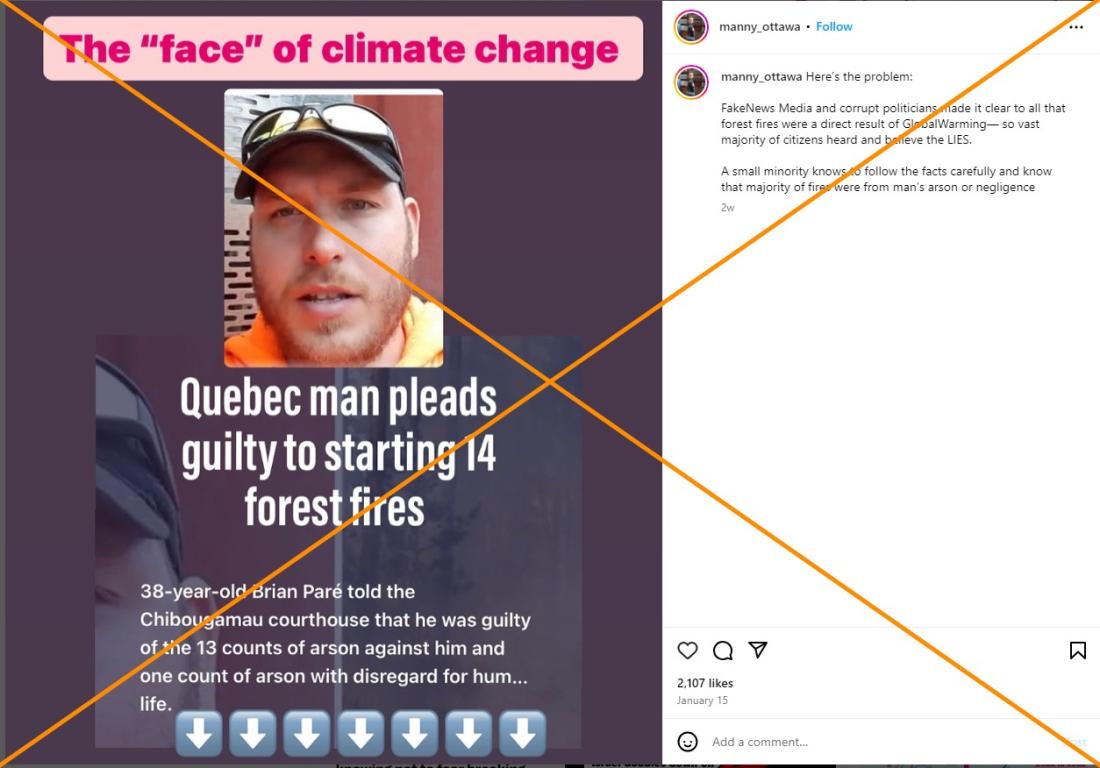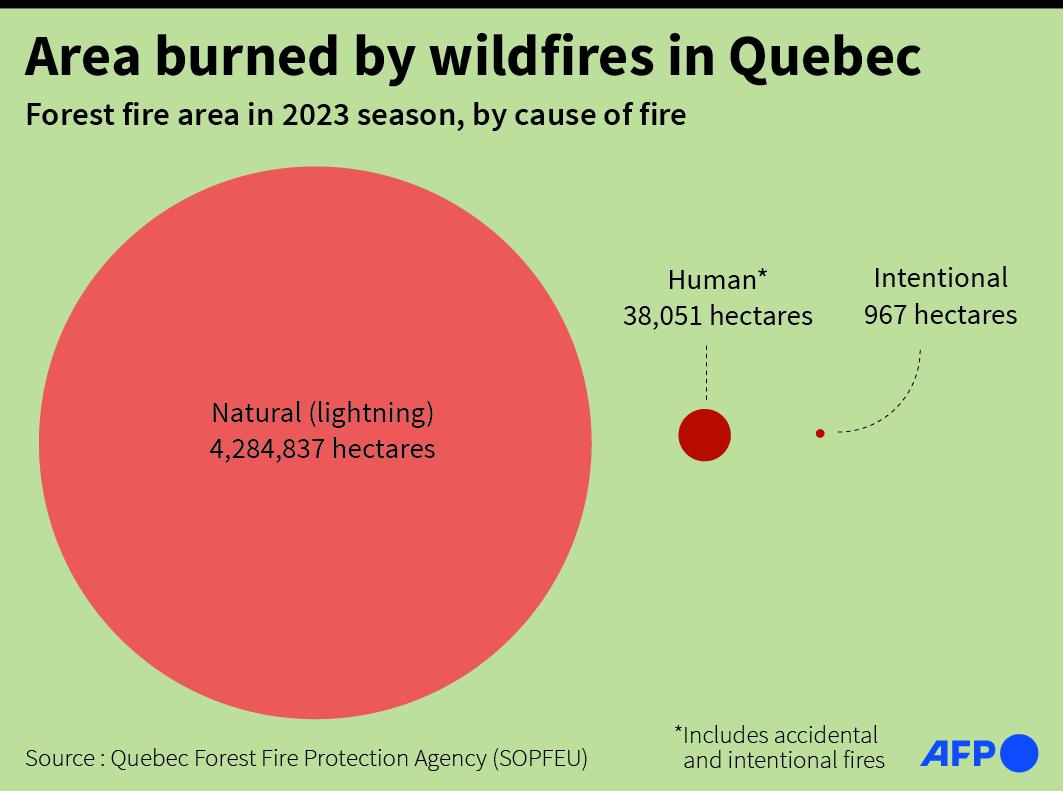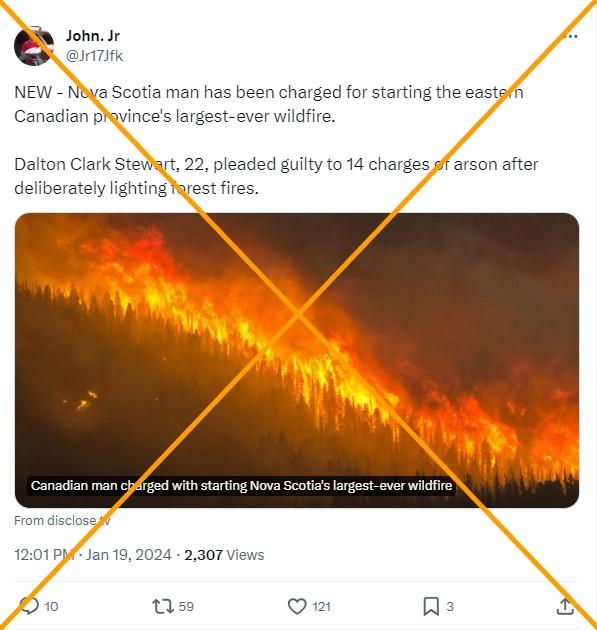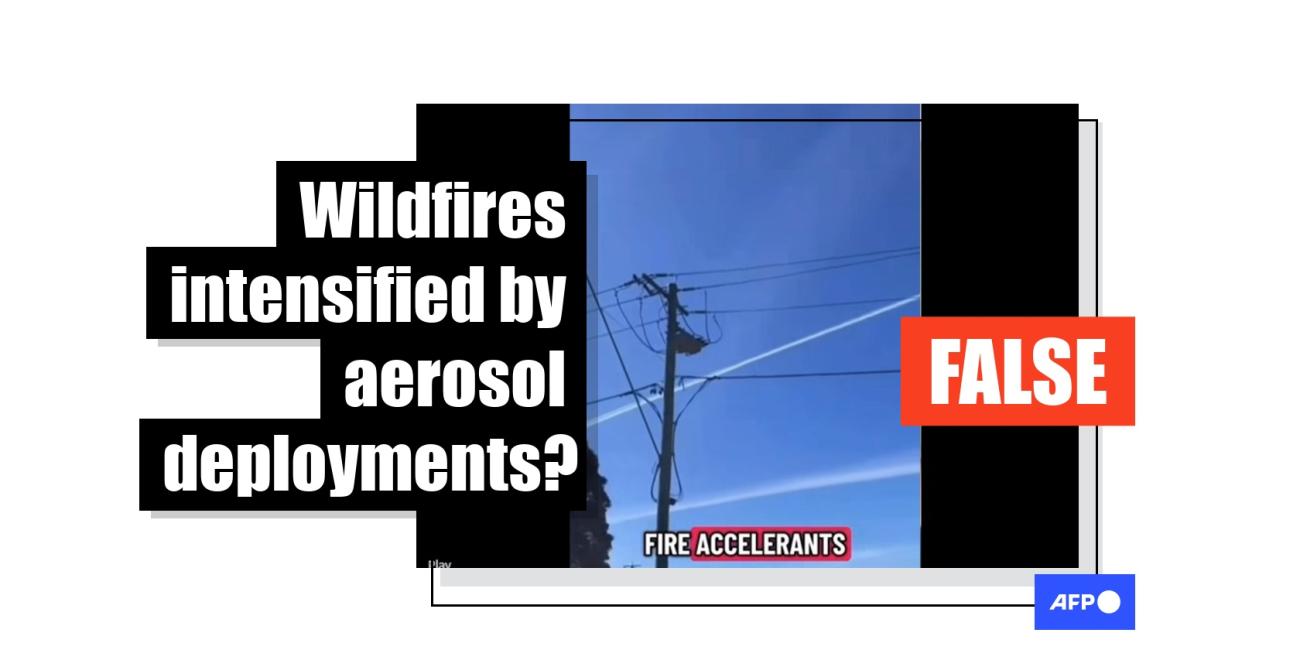
Misleading claims spread on 2023 Canadian wildfires after charges filed
- This article is more than two years old.
- Published on January 31, 2024 at 22:32
- Updated on January 31, 2024 at 22:35
- 5 min read
- By Gwen Roley, AFP Canada
"A Canadian radical climate change activist has been found guilty of starting 14 fires," claims a January 20, 2024 post on X, formerly Twitter.
The post references the news of the guilty plea of Brian Paré to arson charges which were found to have been at the root of a handful of forest fires in the Canadian province of Quebec. Other posts on X, Instagram, TikTok and Facebook highlighted Paré's case, implying these criminal actions proved arson was the main cause of wildfires during the devastating summer of 2023.


Further posts also extrapolated on the recent news that Dalton Clark Stewart had been accused of starting the Barrington Lake fire in Nova Scotia, which was the largest wildfire in the province's history.
"Just like the Quebec fires, it was arson and not climate change," says the text of a January 18 Facebook post sharing a headline of the Nova Scotia case.
Canada's record-breaking wildfire season began in May 2023 with intense flames in Alberta, followed by numerous blazes across the country which lasted into September and burned more than 18.4 million hectares (45.7 million acres), according to the Canada Interagency Forest Fire Centre (archived here).
Throughout the summer, AFP reported on social media posts which claimed without evidence that the fires had been started by malicious actors, often blaming the government or ecological activists for starting the blazes to prove the existence of climate change.

The legal cases involving Stewart and Paré have reignited conspiratorial narratives, but Mike Flannigan, a professor of fire science at Thompson Rivers University, said that while many fires have human causes, increasing weather extremes driven by climate change caused dry conditions and thunderstorms. This combustible environment played a large role in the exceptional 2023 wildfire season.
"It was extreme fire weather and the drought that brought us to 2023, over a large swath of Canada for a long period of time," he said. "This is climate change in action."
Arson remained rare in Quebec
Prosecutor Marianne Girard told AFP that Paré pleaded guilty to 14 of the 16 arson-related charges laid against him. While many of the posts on social media claimed Paré was an "ecoterrorist," starting wildfires to prove climate change was real, Girard said he was actually sharing similarly unfounded claims.
"Evidence had actually emerged that he had made comments, had an allegiance towards conspiracy theories... that in fact the government was creating climate change," she said in an interview on January 30, 2024.
Posts still published on Paré's Facebook page claim the government wanted to burn down the country and had manufactured climate change.
Philippe Bergeron, a spokesman for the Quebec Forest Fire Protection Agency (SOPFEU), said in a January 25 email that while he could not say how many hectares were burned because of Paré, human-caused fires with a criminal origin represented a small minority of wildfires in the province.
According to Bergeron, of the over 4.2 million hectares (10.4 million acres) burned in Quebec in 2023, 966.9 hectares (2,389.26 acres) -- less than 0.025 percent -- were caused by arson. The rest of the fires were either caused by lightning or non-criminal human causes.

Social media users often imply a human-caused fire automatically means arson, but Bergeron said there are many accidental causes -- such as poorly extinguished campfires or cigarette butts -- which are recorded as wildfires with human origins.
"A human-caused fire is caused by negligence and is not intentional," he said. "A fire with a criminal origin is caused with a malicious intention."
He also noted that 2023 was an exceptionally low year for human-caused fires given so many were sparked by lightning, while in a typical season electric strikes account for about 20 percent of wildfires.
Ongoing Nova Scotia cases
Certain posts on social media conflated Stewart's case with Paré's, saying "Dalton Clark Stewart, 22, Pleaded GUILTY to 14 Charges of ARSON after Deliberately Lighting FOREST FIRES," but the accusations in Nova Scotia have yet to be heard in court.
According to a January 18, 2024 government press release (archived here), Stewart was charged under the Nova Scotia Forest Act (archived here) with starting the Barrington Lake fire, which burned through some 23,000 hectares (56,834 acres) -- about 94 percent of the area burned in the province for 2023 -- between late May and late July. The release said that the case would now move to a court which would determine penalties should the allegations be sustained.

The Barrington Lake investigation is currently being led by the province's Department of Natural Resources and Renewables (DNRR), which told AFP that Stewart is facing regulatory, not criminal charges. The department said it had been working with the Royal Canadian Mounted Police (RCMP) to collect evidence into the causes of the Barrington Lake fire, but the police service said it had closed its file on the case.
"It was determined that the information and evidence gathered from the scene did not meet the threshold for criminal charges, concluding our file," RCMP spokesman Dominic Laflamme said in a January 30, 2024 email.
The DNRR is still investigating the causes of the Tantallon fire which burned through 969 hectares (2,394 acres) around the same period as the blaze at Barrington Lake, according to the January 18 press release. The RCMP said it had concluded its file into the Tantallon fire and had also handed the case to the DNRR.
Climate change worsening wildfire seasons
There is a broad consensus among scientists that human-caused climate change is warming the environment (archived here). Thompson Rivers' Flannigan said these increased temperatures have contributed to flammable conditions in locations that experience extreme wildfire seasons such as California, Australia and Canada.
"Our fire seasons are getting longer and that's because our climate is getting warmer," he said.
Flannigan explained that the total area burned in Canada had been increasing over previous years and that while 2023 was a statistically exceptional year, the expansion of wildfire seasons is consistent with what research had predicted concerning the impacts of drier, hotter conditions and a volatile atmosphere which creates more thunderstorms.
"It's getting worse and worse and will continue to get worse and worse," he said. "There's other things we can do with respect to fire management, but until we do something about climate change, the bottom line is, there's going to be more fire and more smoke in our future."
Read more of AFP's reporting on misinformation in Canada here.
This story was updated to add a dropped word in paragraph 23.January 31, 2024 This story was updated to add a dropped word in paragraph 23.
Copyright © AFP 2017-2026. Any commercial use of this content requires a subscription. Click here to find out more.
Is there content that you would like AFP to fact-check? Get in touch.
Contact us




